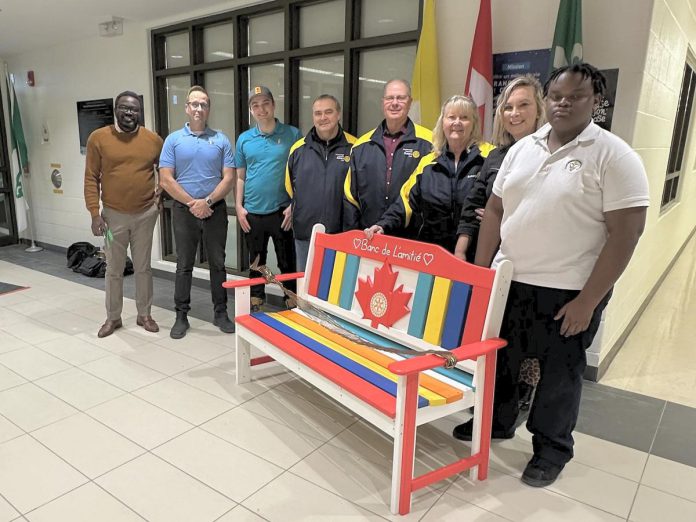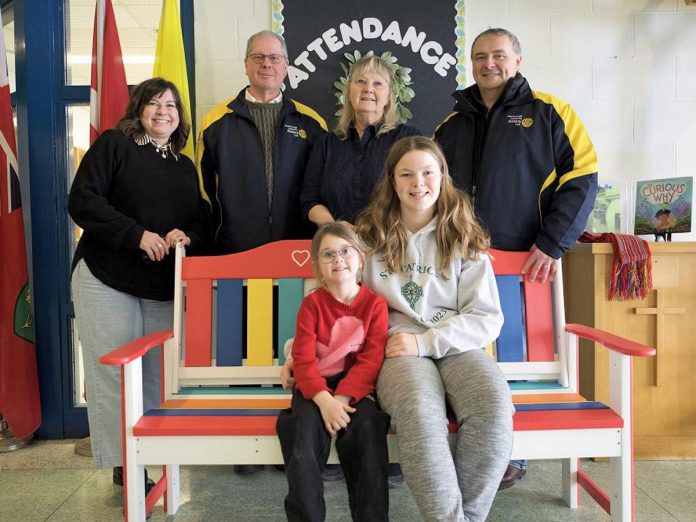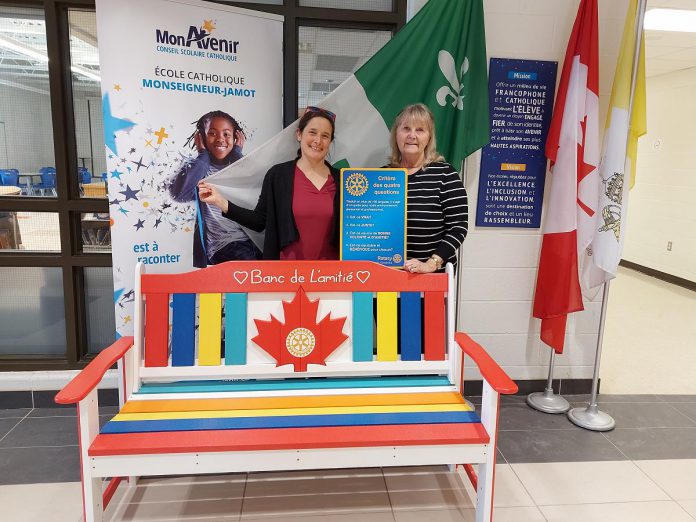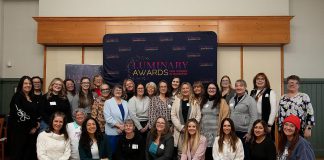
The Rotary Club of Peterborough Kawartha is helping young people form connections by reintroducing the Buddy Bench program at two local schools.
Over the winter, École Catholique Monseigneur-Jamot and St. Patrick Catholic Elementary School in Peterborough each received a colourful schoolyard bench to be used to foster friendships and promote inclusivity among students.
“Being involved in this initiative aligns with our commitment to creating a supportive and inclusive environment where every child feels seen, heard, and valued,” says Andrea Hatton, secretary for the high school side of École Catholique Monseigneur-Jamot. “It allows them to seek comfort without needing to speak a word. It serves as a gentle reminder to those around them that sometimes a quiet need for connection is just as important as words.”
An initiative that has taken place in communities around the world, the local Buddy Bench project was initiated in 2017 by late Rotarian Donna Geary and her son Nate Loch. The first bench was installed at St. Catharine’s Catholic Elementary School in Peterborough and, since then, Rotary has donated 12 more benches to schools around the region.
“It’s a fun, inclusive place where kids can join each other for some fun and some comradery,” says Rotarian Brenda Booth, who is leading the project. “In every place we’ve put them, they’re like magnets. They’re so fun and colourful, and the children clamber all over and can hardly wait to get on that bench.”
The benches are custom made by Taylors Recycled Plastic Products in Peterborough using recycled materials. While benches in other communities are typically solid in colour — often red — the local benches are uniquely colourful.

“We wanted to deal with a local company and that worked well with being environmentally friendly, because the environment is another focus for Rotary International,” says Booth. “We wanted them to appeal to the children and what they like is the bright colours and, in a subtle way, it speaks to inclusivity.”
Further highlighting the inclusivity, the bench given to École Catholique Monseigneur-Jamot this winter had the words “Buddy Bench” written in French (“Banc de L’amitié”). Hatton says the school was “deeply appreciative that the bench could be customized in French to reflect our school’s unique identity and inclusivity.”
“As a small francophone community, we do sometimes get overlooked — but in this case, they put us front and centre,” she says. “The Banc de l’amitié made for our school is such an amazing gift.”
With the relaunch of the Buddy Bench program, which had been on hiatus since the start of the pandemic, the Rotary Club of Peterborough has included the donation of signs to each school that outline the Four-Way Test, which Booth describes as a “cornerstone of a Rotarian and Rotary International.”
The adaptable philosophy involves asking a set of four questions that serve as a moral compass: Is it the truth? Is it fair to all concerned? Will it build goodwill and better friendships? Will it be beneficial to all concerned?
“If everyone lived by the Four-Way Test, we wouldn’t need benches, there wouldn’t be wars, the world would be a kinder place to live, and we would be inclusive and tolerant,” Booth says. “That’s why as a Rotary club has included Four Way as part of our Buddy Bench program.”

At École Catholique Monseigneur-Jamot, one of the donated signs will be placed in the foyer so as to be easily seen by staff and students, “offering daily encouragement and reminders of our shared values,” Hatton says, while the second will be displayed in the cafeteria seating area.
“Sometimes, we all need to pause, even if just for a minute, to reflect on the questions on the Four-Way Test sign,” she says. “It’s an important reminder to slow down and think carefully about our actions. This simple reflection helps foster positive relationships and encourages thoughtful, respectful interactions with others.”
Booth says including the Four-Way Test when donating the benches to the schools has seen a great response with many educators, noting they hope to find a way to include the test in the school’s curriculum.
“It would be great to build an activity around it and it would be great for role play,” she says.
While École Catholique Monseigneur-Jamot has plans to eventually move the bench outdoors in the summer months, Hatton still acknowledges that its current location in the foyer has proven to be just as impactful, with students and teachers alike pausing to sit and reflect with the help of the bench.
“It’s become a quiet little space for all ages to take a breath in the middle of a busy day,” she says.
“Sometimes a simple bench can be more than just a seat — it can be a reminder to slow down, take a moment, and just be.”

























